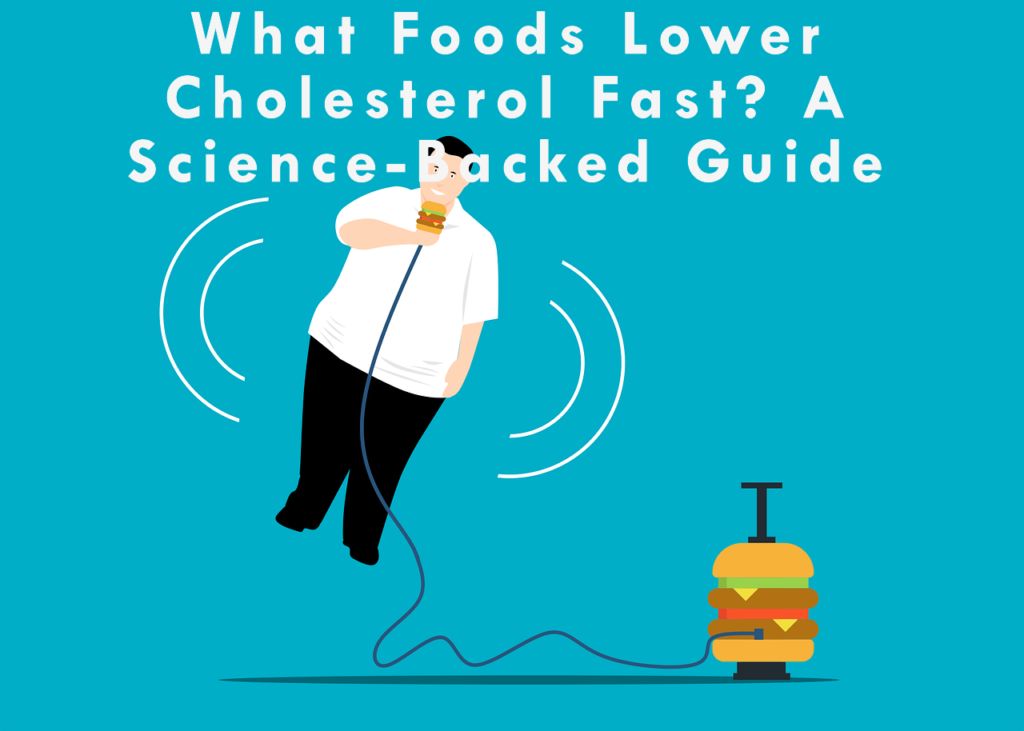
High cholesterol levels, particularly LDL (low-density lipoprotein), can increase the risk of heart disease and stroke. While medications can help, dietary changes play a crucial role in managing cholesterol levels naturally. In this article, we’ll explore the best foods that can help lower cholesterol fast, backed by science, and how to incorporate them into your daily diet for maximum benefit.
Understanding Cholesterol: The Good and the Bad
Cholesterol is a fatty substance that circulates in the blood. It is classified into two main types:
- LDL (Bad Cholesterol): High levels of LDL can lead to plaque buildup in arteries, increasing the risk of heart disease.
- HDL (Good Cholesterol): Helps remove excess cholesterol from the bloodstream, reducing the risk of cardiovascular issues.
A heart-healthy diet can effectively lower LDL cholesterol while promoting HDL cholesterol. Below are the top foods scientifically proven to lower cholesterol quickly and naturally.
1. Oats and Whole Grains
Oats and whole grains are rich in soluble fiber, particularly beta-glucan, which helps reduce LDL cholesterol by binding to it and removing it from the body.
How to Include in Your Diet:
- Start your day with a bowl of oatmeal topped with fruits and nuts.
- Opt for whole-grain bread, brown rice, and quinoa instead of refined grains.
2. Fatty Fish (Salmon, Mackerel, Sardines)
Fatty fish are high in omega-3 fatty acids, which help lower triglycerides, reduce inflammation, and increase HDL cholesterol.
How to Include in Your Diet:
- Eat at least two servings of fatty fish per week.
- Bake, grill, or steam fish instead of frying.
3. Nuts (Almonds, Walnuts, Pistachios)
Nuts contain healthy fats, fiber, and plant sterols, which help lower LDL cholesterol while increasing HDL cholesterol.
How to Include in Your Diet:
- Snack on a handful of unsalted nuts.
- Add chopped nuts to salads, yogurt, or oatmeal.
4. Legumes (Lentils, Beans, Chickpeas)
Legumes are an excellent source of soluble fiber and plant-based protein, which reduce cholesterol absorption in the gut.
How to Include in Your Diet:
- Replace meat with lentils or beans in soups, stews, and curries.
- Prepare hummus as a healthy dip.
5. Fruits Rich in Pectin (Apples, Pears, Berries, Citrus Fruits)
Pectin, a type of soluble fiber found in fruits, helps lower LDL cholesterol by binding to cholesterol molecules in the digestive system.
How to Include in Your Diet:
- Eat an apple or a handful of berries as a snack.
- Add citrus fruits to your smoothies or salads.
6. Avocados
Avocados are rich in monounsaturated fats and fiber, which help lower LDL cholesterol while increasing HDL cholesterol.
How to Include in Your Diet:
- Spread avocado on whole-grain toast instead of butter.
- Add sliced avocado to salads and sandwiches.
7. Olive Oil
Extra virgin olive oil contains polyphenols and monounsaturated fats that help reduce bad cholesterol levels and support heart health.
How to Include in Your Diet:
- Use olive oil for cooking instead of butter.
- Drizzle olive oil over salads and roasted vegetables.
8. Dark Chocolate and Cocoa
Dark chocolate with at least 70% cocoa contains flavonoids that improve cholesterol levels and enhance heart health.
How to Include in Your Diet:
- Enjoy a small piece of dark chocolate as a treat.
- Add cocoa powder to smoothies or oatmeal.
9. Garlic
Garlic contains allicin, a compound known to lower cholesterol and blood pressure.
How to Include in Your Diet:
- Add fresh garlic to soups, sauces, and stir-fries.
- Consume raw garlic for maximum benefits.
10. Green Tea
Green tea is rich in catechins, antioxidants that help lower LDL cholesterol and improve heart health.
How to Include in Your Diet:
- Drink 2–3 cups of green tea daily.
- Use matcha powder in smoothies or teas.
11. Flaxseeds and Chia Seeds
Both flaxseeds and chia seeds are high in omega-3 fatty acids and fiber, which help lower cholesterol.
How to Include in Your Diet:
- Add ground flaxseeds to smoothies, oatmeal, or yogurt.
- Sprinkle chia seeds over salads or mix them with water to make chia pudding.
12. Soy-Based Foods (Tofu, Soy Milk, Edamame)
Soy proteins have been shown to reduce LDL cholesterol levels when consumed regularly.
How to Include in Your Diet:
- Drink soy milk instead of regular milk.
- Add tofu or edamame to stir-fries and salads.
13. Dark Leafy Greens (Spinach, Kale, Swiss Chard)
Leafy greens contain carotenoids and fiber that help reduce cholesterol absorption in the body.
How to Include in Your Diet:
- Add spinach or kale to smoothies and salads.
- Sauté greens with olive oil and garlic for a delicious side dish.
14. Turmeric
Curcumin, the active compound in turmeric, has been found to reduce cholesterol and inflammation.
How to Include in Your Diet:
- Add turmeric to soups, curries, or golden milk.
- Take turmeric supplements if needed.
15. Fiber-Rich Vegetables (Broccoli, Carrots, Sweet Potatoes)
Vegetables high in soluble fiber can help lower cholesterol by preventing its absorption in the bloodstream.
How to Include in Your Diet:
- Include a variety of colorful vegetables in every meal.
- Roast, steam, or eat raw as snacks.
Final Tips for Lowering Cholesterol Fast
To maximize the benefits of these cholesterol-lowering foods, consider the following lifestyle changes:
- Reduce Saturated and Trans Fats: Avoid processed foods, fried items, and excessive red meat consumption.
- Increase Physical Activity: Regular exercise helps boost HDL (good cholesterol) and lower LDL (bad cholesterol).
- Stay Hydrated: Drink plenty of water to support overall metabolic functions.
- Limit Sugar and Refined Carbs: Excess sugar contributes to higher cholesterol and triglyceride levels.
- Practice Stress Management: Chronic stress can negatively impact heart health.
By incorporating these nutrient-rich foods into your daily diet and maintaining a healthy lifestyle, you can lower cholesterol levels naturally and protect your heart health. Start making these small changes today, and your heart will thank you.
Do you have any favorite cholesterol-lowering recipes? Share your thoughts in the comments below.
